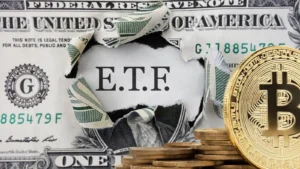With their groundbreaking technology, blockchain and Bitcoin have been making waves across the globe, particularly in regard to US-China trade. It is clear that this innovative force could potentially revolutionize many industries as we know them today. One of the most significant global industries is international trade, as exemplified by the US-China partnership. As experts observe how to best utilize bitcoin and blockchain technology in this domain, there could be a potential shift in their relationship dynamics. In this blog, we’ll look into details of Bitcoin and US-China trade and the relationship between the two. Keep reading to know more!
Introduction of Bitcoin in global trade
With the advancement of digital technology, Bitcoin is slowly becoming a preferred mode of payment for consumers and businesses across the world. By utilizing blockchain technology and cryptocurrency processes Bitcoin is revolutionizing global trade and evolving how transactions are done. From its innovative trustless principles to its decentralised model, this digital asset has become widely accepted as an efficient way to carry out transactions, especially in countries where traditional banking options are limited or restricted. What’s more, due to its transparency and secure data management practices many business owners are witnessing potential cost savings with the introduction of Bitcoin for their everyday trades.

How Bitcoin can revolutionize global trade?
Bitcoin has the potential to revolutionize global trade. Already, thousands of merchants around the world are accepting payments in cryptocurrency – a phenomenon that could transform the way goods and services are exchanged between countries. Going beyond merely enabling token payments, Bitcoin could facilitate friction-free international transactions in a secure yet decentralized environment, with minimal middleman intervention. Furthermore, by eliminating third-party approval delays and simplifying payment settlement procedures globally using blockchain technology, Bitcoin can reduce transaction costs for both buyers and sellers significantly. In short, Bitcoin promises to revolutionize global trade in meaningful ways and bring about increased efficiency and convenience for all parties involved.
History of US-China trade
The history of US-China trade dates back to the late 18th century when American traders began to look for an outlet for their goods in the Far East. The Chinese market was attractive as it had inexpensive labour and a large population, which could absorb large volumes of goods. As a result, US direct exports to China increased steadily over the decades until about 1850. Since then bilateral trade has grown rapidly with total annual exports reaching $648 billion USD mostly consisting of raw materials & manufactured products sent outbound while primarily consumer electronics come back home across both Pacific & Atlantic routes combined respectively making this one very lucrative relationship indeed.
What are the benefits of this Trade in terms of crypto
The US-China trade relationship is an important one, and its impact on the digital currency space can be profound. Cryptocurrencies are proving to be a transformative addition to the global economy and both nations stand on the cusp of playing major roles in its growth. Here is a list of a few benefits:
1. Cryptocurrency is not subject to inflation.
The US dollar is subject to inflationary pressures, which can erode the purchasing power of American consumers. Cryptocurrency, on the other hand, is not subject to inflationary pressures. This means that Bitcoin or other cryptocurrency holdings will maintain their value over time, which can be a major benefit for investors.

2. Cryptocurrency is not subject to government regulation.
Another potential benefit of cryptocurrency is that it is not subject to government regulation. This means that there is no central authority that can control the supply of Bitcoin or other cryptocurrencies. This could potentially make cryptocurrency a more stable investment than traditional fiat currencies.
3. Cryptocurrency transactions are fast and cheap.
Another potential advantage of cryptocurrency is that transactions are fast and cheap. Traditional bank transfers can take days to process and often come with hefty fees. Cryptocurrency transactions, on the other hand, are typically processed within minutes and come with very low fees. This makes cryptocurrency an attractive option for those looking to send money internationally.
4. Cryptocurrency offers more privacy than traditional payment methods.
Privacy is another potential benefit of cryptocurrency. When you make a traditional bank transfer, your personal information is typically attached to the transaction. With cryptocurrency, however, transactions are pseudonymous, which means that your personal information is not attached to the transaction. This could be a major advantage for those who value their privacy.
5. US-China trade in cryptocurrency could help to reduce tensions between the two countries
US-China relations have been tense in recent years, but trade in cryptocurrency could help to reduce tensions between the two countries. Cryptocurrency is borderless and does not require government approval, which could make it an ideal way for the two countries to trade with each other without having to go through traditional channels.
How US-China Trade correlated with Bitcoin?
The US-China trade tensions have had a significant impact on the cryptocurrency market, with Bitcoin being the first and most affected asset. The main reason for this is that the Chinese yuan is one of the main fiat currencies used to buy Bitcoin in Dubai‘s over-the-counter (OTC) markets.
History
When China announced tariffs on US goods in July 2018, investors began to sell off their bitcoin holdings in fear of an economic fallout due to escalating trade tensions between both countries. This led to a sharp decline in bitcoin prices as traders sought out safe havens from losses that may be incurred if there were further sanctions or restrictions on either side of the trade dispute. After intense negotiations, Presidents Trump and Xi Jinping agreed upon terms for a phase 1 US-China trade deal which helped bring some stability back into markets towards late 2019 and early 2020.
In present
Since then, we’ve seen increases in capital inflows into cryptocurrency assets as more institutional investors look at alternatives outside of traditional financial instruments like stocks and bonds; many taking advantage of increased volatility brought by global macroeconomic conditions such as Brexit uncertainty and overall international political unrest led by world leaders’ responses regarding climate change efforts along with geopolitical events such as heightened tensions between various states within Asia Pacific region leading up to last year’s Tokyo Olympics Games originally scheduled for July 2021 (that was postponed).
Expectations
As speculation continues around currency values even beyond just USD/CNY pairings against each other, We can expect that there will continue to be correlations between these exchange rates as well as cryptocurrency assets all playing their own parts when it comes to predicting where the value lies amidst shifting macroeconomic conditions worldwide.
Examine the effect of the US-China Trade on Bitcoin
The US-China trade war has had a significant impact on the cryptocurrency markets, particularly with regard to Bitcoin return. As the two countries imposed tariffs on each other’s goods and services over the past few years, investors have sought refuge in store-of-value assets such as gold and bitcoin. On May 2020, when China declared its ban on financial institutions from participating in cryptocurrency-related activities, bitcoin plunged nearly 18%. This news followed an announcement from President Trump that he planned to impose 25% tariffs on $200 billion worth of Chinese imports. In response, Chinese Vice Premier Liu stated that it would take necessary countermeasures if the tariffs were enacted.
Downfall of bitcoin
This kind of uncertainty gave way to fears among investors concerning a possible trade conflict between both nations, as well as speculation that other governments might follow suit by enacting similar bans or restrictions against cryptocurrencies like Bitcoin. These fears caused exchanges around the world to experience major selloffs which caused Bitcoin’s price to crash by more than 50%. Further complicating matters is China’s ongoing currency manipulation issues which have further weakened their economy while increasing instability in other global markets – including those related to cryptocurrencies like Bitcoin. For instance, many traders who were once bullish about BTC/USD switched towards bearish sentiment due likely partly in reaction to China’s loosening currency policies – causing a decrease in demand for digital currencies like bitcoin worldwide and leading prices downwards substantially during late 2021.
FAQs
What is the trade relationship between the US and China?
The trade relationship between the United States and China is incredibly complex and spans a multitude of different aspects. The sheer amount of imports and exports between the two countries reflects strong economic cooperation. In 2018, US goods and services trade with China totalled an estimated $737.1 billion according to the Office of the United States Trade Representative (USTR). This was made up of $505.6 billion in exports from the US to China, making it our third-largest goods export market for that year; meanwhile, we imported approximately $231.5 billion in Chinese goods during that same period—making it our largest supplier of imports by far.
Does China have access to Bitcoin?
Yes, China does have access to Bitcoin. In fact, the People’s Bank of China (PBOC) was one of the first major central banks to recognize and regulate cryptocurrencies. The PBOC has stated that it will monitor cryptocurrency operations in order to prevent money laundering activities like terrorist financing. Overall strong governing policies from PBOC coupled with the availability of these services from different entities across various regions within mainland China all make it possible for anyone with internet access regardless of location or financial ability be partaking in this new technological paradigm known as blockchain through means trading virtual currencies like Bitcoin.
Who is winning trade between US and China?
At this moment in time, it is difficult to say who holds the upper hand when it comes to crypto trade between the United States and China. Both countries have taken measures to regulate the cryptocurrency industry, and both are actively engaged in a competitive race for dominance in the market. Despite both countries’ attempts at setting clear rules that would enable them better control over what is happening inside their respective borders when it comes to dealing with digital currency services adequately–the upper hand can not be given merely yet as we are only seeing first results now due solely concrete decisions being made yet by either party involved here ultimately deciding who will come out on top eventually down this road definitively.
Do bitcoin have a future in US and China?
The future of Bitcoin in the United States and China is uncertain, yet promising. In early 2021, President Joe Biden proposed several tax reforms that could help spur innovation in the cryptocurrency industry by providing tax incentives for businesses and individuals who create, buy or hold digital currencies like Bitcoin. This could provide opportunities for those wishing to use cryptocurrencies as a form of payment or investment. Ultimately though whether this asset class succeeds depends largely on both countries’ regulatory environments moving forward; As more nations pass legislation around cryptocurrencies like bitcoin – enabling them to become a legitimate method for exchange –the possibilities for their success increase substantially with US & China being two highly influential players here given their position within global markets.
Is bitcoin a playing weapon in the US-China war?
The use of Bitcoin as a weapon in the US-China trade war has been hotly debated for some time. The question then arises: how does Bitcoin fit into all this? Well, Bitcoin is decentralized and not controlled by any government or institution; this means that it could potentially provide a way for one side to bypass sanctions or tariffs imposed by another nation and still conduct business with them without fear of reprisal from either government or financial institutions. In theory, at least, cryptocurrency could render existing economic restrictions moot if adopted widely enough within international communities – acting as something of a digital loophole through which legal but politically contentious transactions might take place unnoticed among major players like the United States and China.
Does China have the majority of bitcoin?
No, China does not have the majority of bitcoin. In fact, the big picture is far more complicated than that. Currently, it is estimated that around 65% of all bitcoins are held in wallets owned by entities outside of China. It’s worth noting that many times these wallets could be affiliated with Chinese companies or individuals who operate from other countries. In summary then: while we can’t say definitively what percentage of Bitcoin belongs completely independent from any commercial interests located in mainland China; We can confidently say that a significant majority belongs outside its borders-making it safe to conclude that no single jurisdiction has majority control over Bitcoin’s network right now or in the foreseeable future.







